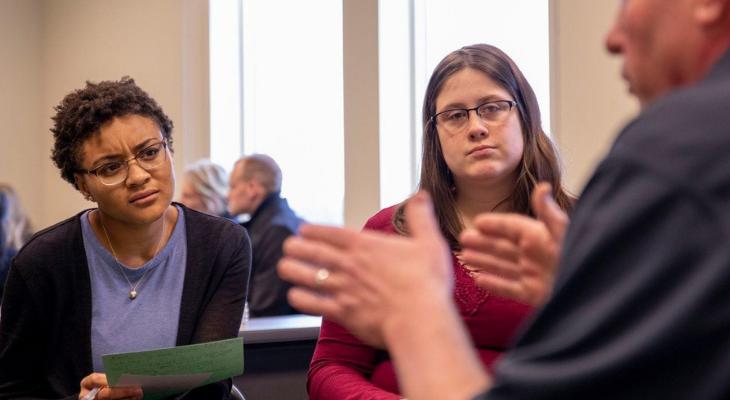Courage and Conversation: In a Divided World, Colleges Partner to Bridge the Gap
August 5, 2021

In an increasingly polarized America, powerful forces in politics, media, and culture advance the notion that those with whom we disagree are the “other” and should be reviled and ridiculed. According to that narrative, students at Oberlin College, known as a bastion of liberal thinking in Oberlin, Ohio, are elite, intolerant “snowflakes.” Students at Spring Arbor University, a private, Christ-centered, liberal arts school in Spring Arbor, Michigan, are labeled as conservative, intolerant evangelicals. Each is supposed to view the other as the irreconcilable opposition.
In January 2020, students from the two schools took part in a winter term project called “Bridging the Gap: Dialogue across Difference” (BTG) to challenge views that depend upon increasingly limiting labels. The goal of BTG was not to paper over differences or create some mushy middle but to honestly engage with the things held dear in each and every camp, trusting that no one is diminished in the process. This engagement was not a path to change minds but to cultivate curiosity about other people’s lives and why they think the way they do. The program began with skill-building within individual campus communities, followed by a formal exchange and encounter across the campus communities, and concluded with a policy application experience where the program participants worked collaboratively to study a pressing policy issue, synthesize learnings, and collaboratively present findings and blue prints for reform.
This past year and a half has been filled with a cluster of emotions. Each day our nation is becoming more polarized. We are living in a society where conversations with one another have been replaced by posts, tweets and videos explaining why the “other” should be “cancelled.” When someone is politically, religiously or ethnically different or does not agree with our worldview we have lost the ability to engage with them. We need to prioritize our common humanity, conjure up some humility, lean into those differences with curiosity and have the tough conversations we are avoiding.
Once we have shared understanding of the need for deeper engagement, we must develop the skills to listen to the “other” whomever that “other” is. We must have listening ears and fight the urge to attack with rebuttals and quick comebacks. This is the core of Bridging the Gap model. Bridging the Gap (BTG) is a program, founded by Simon Greer, that focuses on bridging divides through learning the art of communicating across lines of difference and putting that learning into practice. Here is more about how Simon Greer thinks listening can heal our divisions.
BTG offers classroom learning on communication skills across political, cultural, religious, world view and experiential differences, a cross campus exchange between two partner schools (with very different profiles) to practice these skills, and site visits with a broad range of stakeholders on a public policy issue that is decided upon by the two schools. Through these direct engagements and experiences, the program will teach students how to truly listen, understand, be heard, and seek common ground without attempting to change minds or having to compromise deeply held values. Moreover, this is not an effort to dismiss the deep and genuine divides in our country. Rather, it is a concrete step to give students – our country’s future leaders – the tools to find areas of common ground, create constructive tension, reflect on their own experiences, understand our shared humanity and solve pressing problems with those of different backgrounds and beliefs with whom we share this country. This article in The Journal of College and Character highlights experiences from the BTG pilot program and provides an in-depth description of the BTG approach & methodology.
Below is our invitation, which provides the basic foundation, to how BTG approaches the journey to having courageous conversations:
The Invitation
Our intention is to take seriously the things that
others hold dear. If it matters to you then it will
matter to us;
We are not here to convince anyone they are
wrong or try to change them;
We are curious why people think the way we do
and rather than thinking we are diminished by
listening carefully to ideas we might disagree with,
we trust that we are enhanced by it; and
We believe there is more common ground and
experience than we anticipate and when there
isn’t we can fundamentally disagree with someone
and still respect, even love, them.
Are you an educator looking to equip your students with the skills to be able to have courageous conversations with those they fundamentally disagree with? A facilitator looking to get involved in changing the culture of higher education? If the answer is yes to either of these then we think you or your school would be a great fit for Bridging The Gap!
Bridging The Gap is currently looking to partner with 20 universities/colleges this upcoming 2021 – 2022 academic year.
In addition to universities/colleges we are looking for experienced facilitators eager to be part of a top-notch cohort who will lead our programs across the country. If you are interested in becoming a facilitator click here for more information.
To learn more about the Bridging the Gap experience you can check out the Trailer & FIlm –
Trailer (5 mins): https://drive.google.com/file/d/1g4YY3sVtGNl5IBCISvHWZKOkToWSs1gQ/view?u…
Full Film (20 mins): https://www.arbor.edu/landing-pages/bridging-the-gap-video/
For more information on how to get involved please reach out to us via email: [email protected]
Share
Related Articles
American Civic Life
Is This a Time for Bridgebuilding? 5 Leaders in Conversation
American Civic Life
Racial Equity
Immigrant Faith Communities On Rooting Out Anti-Black Racism



